
3. Risk for adverse neonatal outcomes
linked to glyburide(glibenclamide)
![]()
 Gestational diabetes has been increasingly treated with glyburide(glibenclamide); however, the medication is associated with a higher risk for newborns. Neonates admitted to the neonatal ICU, have respiratory distress, hypoglycemia and birth injury and be large for gestational age compared with newborns from mothers treated with insulin, according to recent findings.
Gestational diabetes has been increasingly treated with glyburide(glibenclamide); however, the medication is associated with a higher risk for newborns. Neonates admitted to the neonatal ICU, have respiratory distress, hypoglycemia and birth injury and be large for gestational age compared with newborns from mothers treated with insulin, according to recent findings.
![]() “The convenience factor makes glyburide an attractive option for women with gestational diabetes, but, in light of these findings, we need to better understand which patients can be managed effectively with this drug,” said Michele Jonsson Funk(PhD, of the University of North Carolina at Chapel Hill).
Funk with Wendy Camelo Castillo, PhD, of the University of North Carolina at Chapel Hill, and colleagues evaluated 110,879 women with gestational diabetes from a nationwide U.S. employer-based insurance claims database from 2000 to 2011 to determine the risk for adverse maternal and neonatal outcomes in these women treated with glyburide or insulin.
“The convenience factor makes glyburide an attractive option for women with gestational diabetes, but, in light of these findings, we need to better understand which patients can be managed effectively with this drug,” said Michele Jonsson Funk(PhD, of the University of North Carolina at Chapel Hill).
Funk with Wendy Camelo Castillo, PhD, of the University of North Carolina at Chapel Hill, and colleagues evaluated 110,879 women with gestational diabetes from a nationwide U.S. employer-based insurance claims database from 2000 to 2011 to determine the risk for adverse maternal and neonatal outcomes in these women treated with glyburide or insulin.
![]() Overall, 8.3% of participants were treated with glyburide (n = 4,982) or insulin (n = 4,191). Hypothyroidism and infertility treatment were more common among the insulin group, whereas obesity and hospitalization were more common in the glyburide group.
Overall, 8.3% of participants were treated with glyburide (n = 4,982) or insulin (n = 4,191). Hypothyroidism and infertility treatment were more common among the insulin group, whereas obesity and hospitalization were more common in the glyburide group.
![]() A higher risk for admission to the neonatal ICU, neonatal hypoglycemia and large for gestational age were more common among newborns born to the glyburide group compared with those born to the insulin group. However, the glyburide group was not at increased risk for obstetrical trauma, preterm birth or jaundice. The glyburide group had a 3% lower risk for cesarean delivery compared with the insulin group.
A higher risk for admission to the neonatal ICU, neonatal hypoglycemia and large for gestational age were more common among newborns born to the glyburide group compared with those born to the insulin group. However, the glyburide group was not at increased risk for obstetrical trauma, preterm birth or jaundice. The glyburide group had a 3% lower risk for cesarean delivery compared with the insulin group.
![]() “After accounting for maternal comorbidities and risk factors for neonatal outcomes, we found an association between glyburide (compared with insulin) and elevated risk of NICU admission, neonatal hypoglycemia, respiratory distress, birth injury and large for gestation age in women with gestational diabetes,” the researchers wrote. “These results are consistent with findings from prior studies and suggest that women with gestational diabetes being treated with glyburide may not be achieving adequate glucose control.”
“After accounting for maternal comorbidities and risk factors for neonatal outcomes, we found an association between glyburide (compared with insulin) and elevated risk of NICU admission, neonatal hypoglycemia, respiratory distress, birth injury and large for gestation age in women with gestational diabetes,” the researchers wrote. “These results are consistent with findings from prior studies and suggest that women with gestational diabetes being treated with glyburide may not be achieving adequate glucose control.”
For enquiries info@jothydev.net.
Please visit: jothydev.net | research.jothydev.com | diabscreenkerala.net | jothydev.com/newsletter
